There are five other Airstreams here! That may not seem like a lot, but it’s a record for any campground we’ve visited on this trip. In fact, it’s the most we’ve ever seen together outside of a rally. So I walked out into the desert sunshine this morning with Emma to go give each one a copy of Airstream Life. There was a 1990s Sovereign 25, a new Classic 30 slide-out, a new International CCD 19, and a 1970s Argosy 24 motorhome, and a unusual 80s “Squarestream” 29 footer with two entry doors.
I got a chance to chat with the owners of the Squarestream (which, if you haven’t seen one, is a boxy fiberglass trailer that Airstream produced only for a short period. They were happy to give me an inside tour while Emma took pictures of their dog with her digital camera.
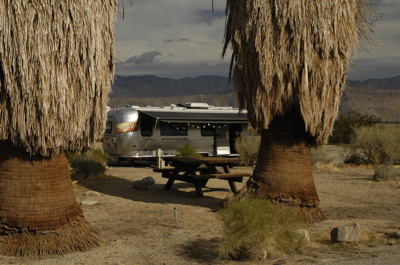
Our campsite is rather ordinary in that it is basically a parcel of pavement off one of the campground loop roads. But the view is extraordinary, surrounded by mountains on three sides, which constantly change in color and detail with the movement of the sun and clouds above. A pair of enormous fan palms (the only type to grow here) are nearby in the sand, casting a morning shadow on our trailer.
The fan palm itself is an interesting thing. They let their upper fronds droop as they grow, sheathing the core of the tree in a thick layer of brown leaves. They are large and magnificent when they mature, like redwoods of the desert. A group of them is a sure sign of water.
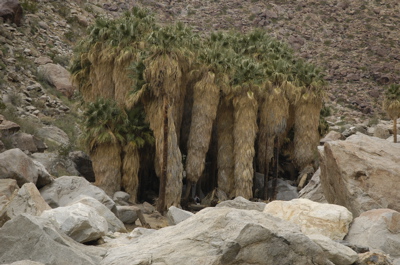
Anza-Borrego is a place for exploring. There are literally hundreds of square miles of area here, filled with wildlife, flowers, canyons, streams, oases, geology, off-road trails, abandoned mines, and hiking trails. The desert is far from empty, if you care to look beyond the highway.
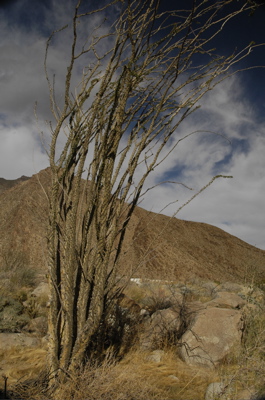
We took Emma on a little hike up to Palm Canyon. This mild 1.5 mile trail (one way) climbs up a dry wash strewn with boulders from giant floods that tumbled down the mountains over thousands of years (and as recently as last September). It turns to a rocky scramble, crossing a perennial stream several times, and ends up at a palm oasis. Along the way we had terrific homeschooling opportunities, talking about desert plants, rocks, and animals.
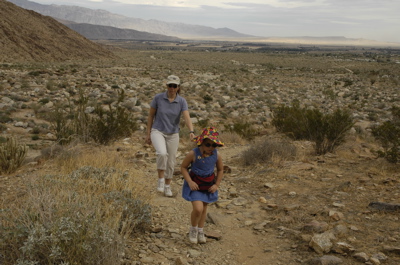
You’ve got to look closely if you want to spot desert flowers. They are out there in abundance when there is water to be had, but often hiding. Heavy rains last September left enough moisture in the ground for them to survive to now. We spotted them in many colors, including a royal purple, a bright red (whose shape was designed for hummingbirds), orange, yellow, and white.
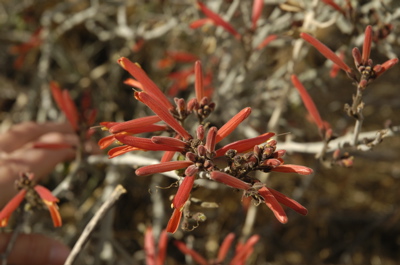
The extra moisture has encouraged other creatures as well. Yesterday we spotted a desert fox, and today we saw a beautiful “Costa’s hummingbird” and honeybees pollinating the desert sage. Unfortunately we struck out on the bighorn sheep, but we have thoughts to try again tomorrow morning when we are more likely to see them. There have been reports of a mountain lion too, but it is very unlikely we will see one since they avoid humans as much as possible.
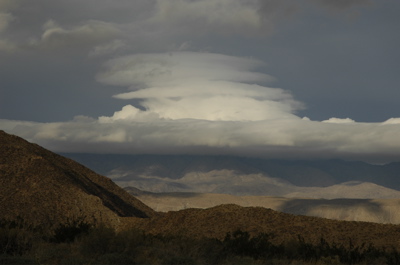
This is “bad weather” for the desert. The wind was blowing gusty all day, and we had a tiny sprinkling rain hit for about 30 seconds this evening. Chance of rain tonight is an astonishing 50%. But nobody’s expecting more than a drip or two. This place only gets 6 inches of rain per year on average. Tomorrow should be nicer.
I posted a pile of photos on Flickr tonight, under the album name “Anza-Borrego Desert State Park”. You’ll see a lot more than what I’ve talked about here if you check them out.


January 1st, 2006 at 12:32 pm
FYI LSU 40 MIA 3